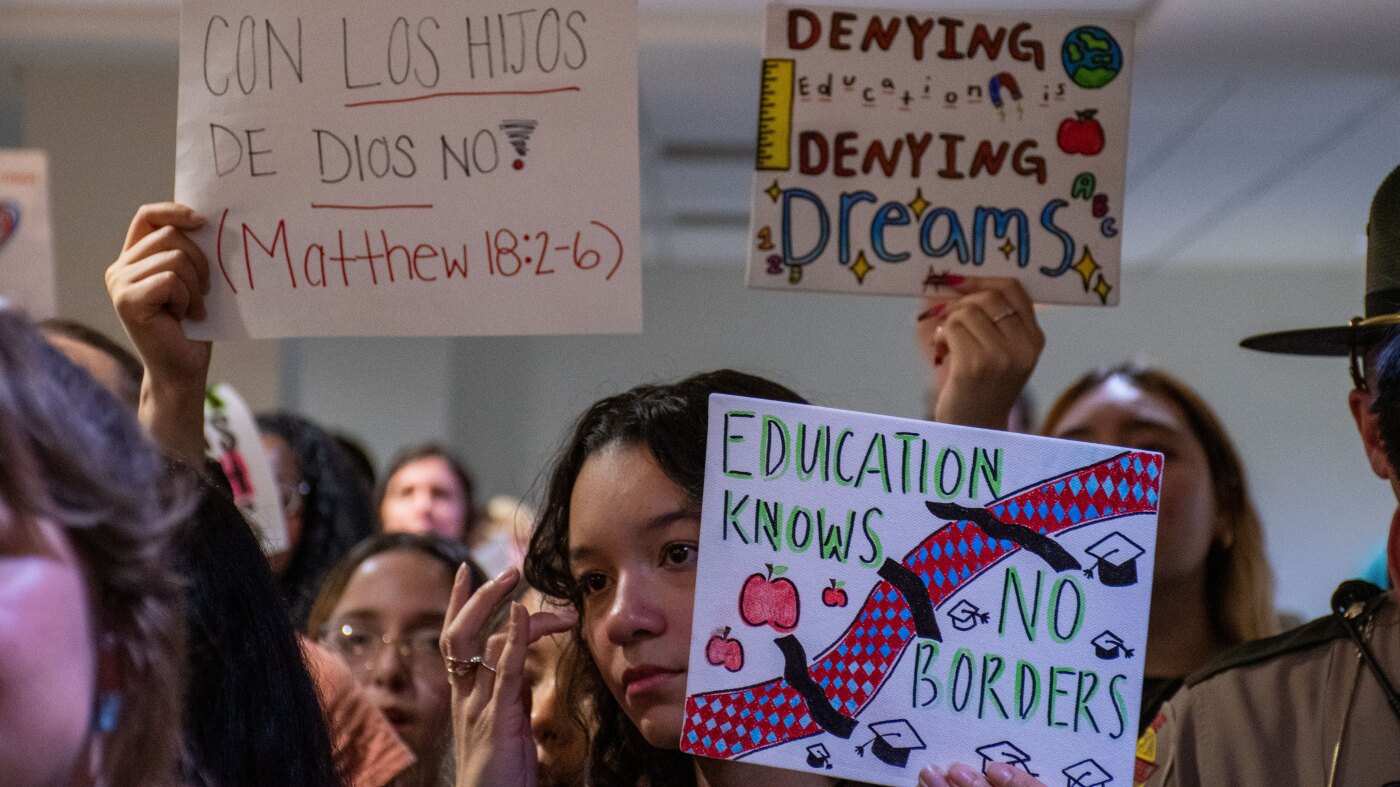
Demonstrators protesting a bill that would’ve allowed schools to deny students based on immigration status at the Tennessee Capitol in Nashville.
Marianna Bacallao/WPLN
NASHVILLE, Tenn. — A significant legislative proposal in Tennessee that aimed to allow public schools to refuse enrollment to children lacking legal immigration status has been put on hold. Despite this pause, the lawmakers behind the bill remain committed to revisiting the measure. This controversial proposal, introduced by Tennessee’s Republican supermajority, has faced intense public opposition and debate. Weeks of protests and contentious discussions have characterized the bill’s journey through the legislative process. However, the fight is not over yet, as those in favor of the measure are determined to bring it back in some form.
Across the United States, Republicans have expressed a desire to provoke a legal challenge that could potentially lead the case back to the U.S. Supreme Court. This strategy mirrors the approach taken by a Mississippi law, which ultimately resulted in the Supreme Court overturning federal abortion rights in 2022. The court’s ruling in the 1982 case Plyler v. Doe previously guaranteed the right to education for all students, regardless of their immigration status.
A Nationwide Strategy
The Heritage Foundation, a conservative think tank known for influencing policy, has urged states to introduce legislation challenging Plyler v. Doe. In a 2024 brief, the Foundation wrote, “Unchecked illegal migration over the past three years has possibly cost the public education system billions of dollars,” arguing that the increase in non-English-speaking children has negatively impacted classrooms. Similar arguments are surfacing in state legislatures nationwide, although there is no comprehensive data on the number of undocumented students in schools. Estimates suggest that most English learners are, in fact, U.S. citizens, as reported by the advocacy group EdTrust.
Despite efforts across multiple states, attempts to challenge Plyler have not succeeded this year. Proposals in Texas, Indiana, and New Jersey have stalled, and Oklahoma’s initiative faced opposition from Republican Governor Kevin Stitt, who pledged to block it. Tennessee’s version of the bill advanced the furthest, narrowly passing the Senate in April. Republican state Sen. Bo Watson co-sponsored the legislation, citing financial concerns. “We have been mandated or forced to pay that additional cost without consideration,” Watson said. “This, my friends — this is the voice of the people being exercised through their elected representatives.”
However, some argue that the bill could have broader economic implications. Phillip Lovell from the non-profit All for Ed highlighted the economic contributions of the undocumented community, stating, “There are estimates that the undocumented community in your state contributes $350 million in taxes. They have a purchasing power of $3.5 billion.” Lovell emphasized that investing in education ultimately benefits the economy, as more education leads to higher earnings and tax contributions.
Financial Concerns Halt Progress
The financial impact of the proposed legislation became a significant obstacle. Republican Rep. William Lamberth withdrew the bill from consideration in the Tennessee House after a state review indicated it could jeopardize over $1 billion in federal education funding due to potential violations of the Civil Rights Act of 1964. Although Lamberth requested clarification from U.S. Secretary of Education Linda McMahon, no response was received before the legislative session concluded.

A protester holds up a sign to demonstrate against a bill in Tennessee that would have allowed public schools to prevent students without legal status from attending.
Marianna Bacallao/WPLN
For immigrant rights activists, the bill’s withdrawal is a victory. Lisa Sherman Luna, executive director of the Tennessee Immigrant and Refugee Rights Coalition, praised the efforts of those who opposed the measure. “To all the children, parents, educators, faith leaders, business owners and everyday Tennesseans who spoke out — your calls, your emails and your presence at the Capitol worked,” she said. The coalition organized numerous protests and marches throughout the legislative session, with participants bearing signs proclaiming “Education for all” and “I stand with immigrants.”
The Future of the Legislation
The bill may be paused, but it is not entirely off the table. Tennessee Republicans plan to revisit the proposal next year, depending on the federal government’s stance. If this measure reaches the U.S. Supreme Court, there are concerns that the outcome might differ from the 1982 decision. Stella Yarbrough, the legal director of Tennessee’s ACLU, pointed out that the court’s conservative majority has a track record of overturning precedent. “I think that they’re reading the tea leaves correctly,” Yarbrough commented. Despite the potential risks, the ACLU is prepared to challenge any law that passes. “Even if you think you’re going to lose in the long run, putting off that loss—even for a day, a week, a year—can be meaningful,” Yarbrough added.
Tennessee previously went before the U.S. Supreme Court in December to defend its ban on gender-affirming care for minors. As the ruling is anticipated this summer, state Republicans will assess whether their strategy is effective with the current court composition.






